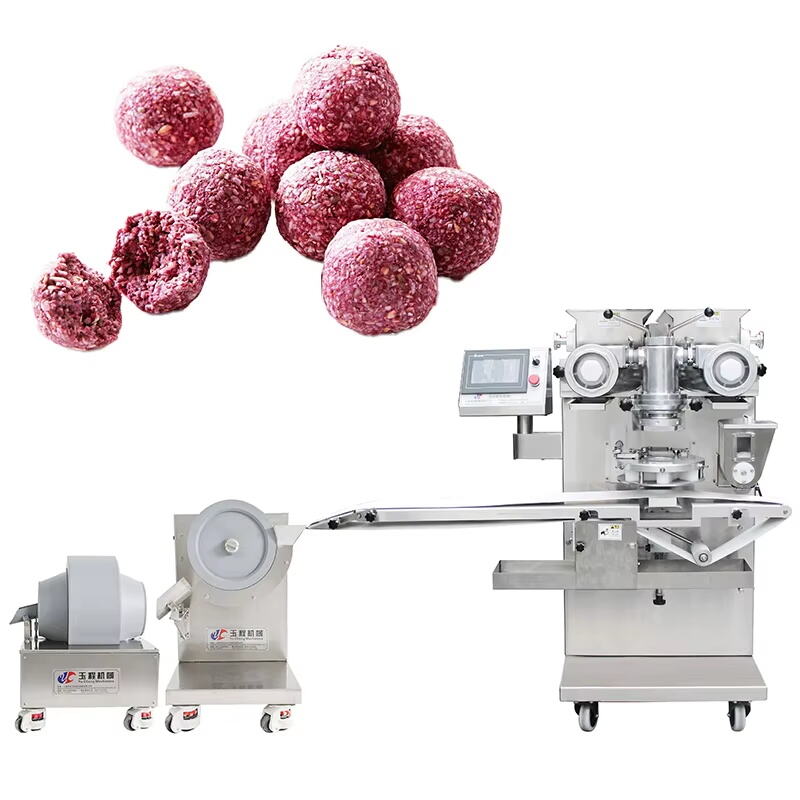Why Regular Maintenance Matters for Energy Ball Machines
Extending Equipment Lifespan
Regular maintenance plays a crucial role in extending the operational life of energy ball machines by preventing premature wear and tear. Experts suggest that proper upkeep can add several years to the lifespan of these machines, thereby safeguarding investments, especially for commercial operations. Routine checks are essential, as they help identify issues before they escalate into costly repairs. This proactive approach is vital for businesses that rely on consistent equipment output and want to avoid interruptions. Additionally, using quality replacement parts during maintenance can further enhance the machine's longevity, ensuring all components work in harmony.
Preventing Bacterial Growth and Contamination
Regular maintenance and cleaning routines are integral in significantly reducing the risk of bacterial growth and contamination in food production environments. Studies show that machinery operating in sanitary conditions leads to lower contamination rates, thereby improving product safety and overall quality. Implementing routine cleaning schedules helps maintain hygiene standards and compliance with health regulations, which is essential for any food-related business aiming to uphold high standards. Through regular cleaning, machines can continue to operate smoothly and produce safe and hygienic products, ultimately protecting consumers and the establishment's reputation.
Daily Cleaning Routine for Optimal Performance
Post-Use Cleaning of Hoppers and Conveyors
A daily cleaning routine is crucial in maintaining the optimal performance of energy ball machines. Specifically, immediately cleaning hoppers and conveyors after use can prevent the buildup of materials, which is fundamental to avoiding issues in future production runs. By systematically ensuring that no residue is left, manufacturers can maintain product quality and reduce spoilage. Furthermore, using the right tools and cleaning agents designed for food machinery ensures thorough cleaning without damaging the equipment. This approach not only secures product integrity but also extends the lifespan of the equipment.
Wiping Down Molds and Forming Components
Effective cleaning procedures extend beyond hoppers and conveyors to molds and forming components. After production, it is essential to wipe down these parts to remove any residue that could harden and affect subsequent batches. Regular cleaning supports adherence to food safety guidelines, significantly lowering the risk of cross-contamination. It's also crucial to train staff in proper cleaning techniques to minimize the risk of damaging delicate equipment components, ensuring surfaces are clean without compromising their integrity.
Using Food-Safe Sanitizers for Surface Disinfection
Disinfection plays a pivotal role in food safety, and using NSF-approved food-safe sanitizers is vital for effectively disinfecting all Contact surfaces in energy ball machines. Regular sanitization reduces pathogen presence, crucially important in food processing environments to guarantee product safety. Moreover, keeping a detailed log of sanitizer usage can streamline audits and compliance checks, and it demonstrates a company’s commitment to maintaining rigorous sanitation standards. By integrating such practices, businesses can both maintain high hygiene standards and adhere to health regulations, ultimately reducing contamination risks.
Weekly Deep Cleaning Procedures
Disassembling Key Components for Thorough Scrubbing
Weekly deep cleaning of Energy Ball Machines should include disassembling key components to ensure thorough scrubbing and hygiene checks. This practice is essential to prevent the buildup that can harbor bacteria and cause operational inefficiencies. By systematically taking apart the machine components, you can reach areas that might otherwise be neglected during routine cleaning. Documented procedures must be adhered to when disassembling and reassembling parts to maintain the machine's integrity. Accurate assembly post-cleaning ensures that the machine remains efficient and operational, minimizing the risks associated with incorrect reassembly.
Removing Residue from Hard-to-Reach Areas
Removing residue from hard-to-reach areas is an integral part of weekly deep cleaning, especially for components that often accumulate unnoticed build-up, posing health risks. Special attention must be given to these areas, using specialized tools like brushes and vacuums designed for machinery. These tools are specifically engineered to access tight spaces and ensure comprehensive cleaning. Once cleaning is completed, conduct thorough checks to confirm that no residue remains, thereby sustaining hygienic conditions. Maintaining thorough cleanliness over time helps in reducing potential contamination and contributes to longer machine life.
Inspecting for Wear on Seals and Gaskets
Regular weekly inspections should include checking seals and gaskets for wear since these are critical for machine performance and leak prevention. According to industry best practices, identifying worn seals early can avert extensive repairs and production downtime. It is advisable to adhere to a maintenance schedule for replacing seals and gaskets—actions which are vital to keeping machine efficiency high and ensuring uninterrupted production. Regular inspections help in preemptively addressing issues, ensuring that the machinery operates smoothly and effectively without unexpected failure or operational hurdles.
By following these weekly deep cleaning procedures, you can significantly elongate the operational life of your Energy Ball Machines, ensure continuous efficiency, and uphold safety and quality standards within the food processing environment.
Lubrication and Mechanical Maintenance
Scheduled Lubrication of Moving Parts
Scheduled lubrication is an essential component of the regular maintenance routine for energy ball machines. It helps to reduce friction and wear on moving parts. Companies employing proper lubrication practices have noted a significant extension in machinery lifespan and a decrease in maintenance costs. The key to maintaining operational efficiency is using appropriate lubricants that meet the manufacturer's specifications. By adhering to these practices, equipment remains in optimal working condition, ensuring less frequent downtime and enhanced performance.
Checking Belt Tension and Alignment
Regular checks of belt tension and alignment are crucial for the smooth operation of machinery. Properly tensioned belts prevent slippage and wear, contributing to energy efficiency and cost savings. Research indicates that correct belt tension can enhance energy efficiency, thus generating savings over time. Ensuring precise alignment checks with specialized tools helps avoid problems that may not be visible to the naked eye, ultimately preserving both the machine's parts and its overall functionality.
Monitoring Motor and Electrical Systems
Consistent monitoring of motor and electrical systems plays a pivotal role in preventing unforeseen breakdowns that can disrupt production. Utilizing advanced monitoring technology offers real-time insights into system health, facilitating timely interventions. Moreover, it's vital to regularly clear debris from vents and cooling systems to support optimal operational temperatures. Maintaining these conditions helps in prolonging the lifespan of motors and electrical components, ensuring sustained productivity with minimal interruptions.
Ensuring Hygiene and Food Safety Compliance
Validating NSF/FDA-Approved Cleaning Agents
Using NSF and FDA-approved cleaning agents is crucial for maintaining compliance with strict food safety standards. These agencies ensure that the products meet stringent health and safety requirements, making them safe for use in food processing environments. By maintaining comprehensive documentation of the approved products used in your facility, you not only prepare for upcoming audits but also enhance staff accountability by clearly showing which products are allowed. It is also essential to regularly update cleaning agent inventories to prevent the accidental use of substances that are not compliant, ensuring ongoing adherence to food safety protocols.
Documenting Sanitation Protocols for Audits
Implementing robust protocols for documenting sanitation processes can significantly streamline audits and demonstrate a commitment to food safety. These detailed records enable managers and auditors to identify any lapses in hygiene practices that can impact compliance, allowing for prompt corrective measures. Protocols should meticulously include signatures and dates, confirming when and by whom sanitation tasks were performed. This thorough documentation not only meets audit requirements but also serves as a reliable source of information for continuous improvement.
Training Staff on Cross-Contamination Prevention
Regular training sessions for staff focused on cross-contamination prevention are vital in maintaining high standards of food safety. These educational programs should cover effective cleaning techniques and emphasize the importance of using equipment designed to minimize contamination risks. By engaging staff in discussions About hygiene practices, you foster a culture of accountability and awareness that strengthens the overall safety of food handling processes. Educated employees are better equipped to identify and address potential contamination risks, ensuring a safer food production environment.
FAQs
Why is regular maintenance crucial for energy ball machines?
Regular maintenance extends the lifespan of machines, prevents premature wear, reduces the risk of bacterial contamination, maintains product quality, and ensures operational efficiency.
What tools and cleaning agents should be used for cleaning?
It is recommended to use tools and cleaning agents specifically designed for food machinery to ensure thorough and safe cleaning without damaging equipment.
How does proper lubrication affect energy ball machines?
Scheduled lubrication decreases friction and wear on moving parts, extending machinery lifespan and reducing maintenance costs.
What role does training play in maintaining food safety?
Training educates employees on preventing cross-contamination and following hygiene practices, leading to safer food production environments.






